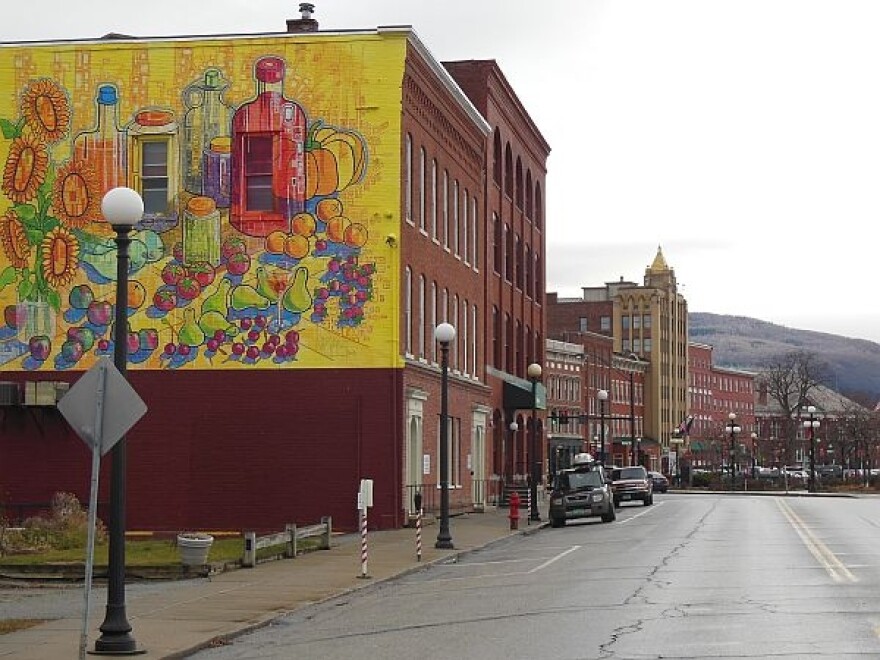As communities across the state work to address issues with drug-related crime, people who work within Rutland County's drug treatment court point to the program as a possible model for success.
Under the program, people who plead guilty to criminal charges have the chance to go through rigorous substance use treatment instead of jail. Backers say the program reduces the strain on the criminal justice system and offers effective support to people experiencing addiction.
Only four of Vermont's fourteen counties have drug treatment courts: Rutland, Chittenden, Washington, and Windsor.
How drug treatment court works in Rutland County
Rutland County State's Attorney Ian Sullivan thinks of drug treatment court as a jail diversion program.
"For people who are high-risk and high-need based on their substance-use-disorder-driven criminal behaviors," he said on Vermont Edition Monday.
A screener with the drug treatment court program determines whether a person is qualifier for the program, based on the discretion of the prosecutor.
Participants in the program meet regularly with case managers and treatment providers, sometimes up to several hours a day. They also need to see a judge every two weeks to keep track of their progress, and submit to regular drug testing.
Drug treatment court participants have "a tremendous amount of responsibilities," said Rutland County's supervising public defender Mary Kay Lanthier.
"Sometimes they don't have driver's licenses and need to make arrangements to get themselves to all of these programs," Lanthier said. "And coupled with that, then they are also expected to begin to look for jobs and housing. And so those are a lot of responsibilities for somebody who is working their way out of — oftentimes —years of drug addiction."
The outcomes
To Sullivan, Rutland County state's attorney, there are two general outcomes of this kind of program.
"There's kind of a door A and a door B," Sullivan said. "Door A is, if they successfully complete the treatment court program, they will get a more lenient outcome [in sentencing]. And door B is, if they do not successfully complete the program — and that is a traditional criminal justice response, likely a jail sentence measured in years."
If people succeed in going through door A, he added, they can achieve lasting sobriety.
"For crimes that are driven by substance use disorder, that is one of the best public safety outcomes we can achieve," he said.
A total of 384 people have entered drug treatment court in Rutland County since the program launched in 2004. Just over 40% — 163 people — completed it.
More from Vermont Public: What recovery means to a health center in Johnson after the floods
Local leaders also look at recidivism rates to determine success. For people who entered the program but didn't finish, their rate of recidivism is just under 70%. For people who did finish, that rate drops to a little over 30%.
Sullivan believes the program's impact goes far beyond what can be conveyed by those numbers.
"When they have made the judge proud, when they have made the prosecutor proud, they can walk away with their heads held high."Mary Kay Lanthier, Rutland County public defender
"People are reengaged in our communities. They're living productive lives and they're members of the community," he said. "That's hard to measure in actual numbers, but it is a tangible, human change that is overwhelmingly positive."
One 2023 treatment program graduate, for instance, was able to hold down a job despite criminal charges in both Vermont and New York. He even had a baby while completing the drug treatment court program, according to the program's coordinator and manager, Rebecca Smith.
"He was able to return to the workforce," Smith said. "He's in long-term recovery. You know, he's doing awesome."
Lanthier, the public defender, said graduating and hearing positive words from judges and prosecutors can mean a lot to her clients.
"These are folks who want the community to want them to succeed," she said. "And when they have made the judge proud, when they have made the prosecutor proud, they can walk away with their heads held high."
Broadcast at noon Monday, Dec. 4, 2023; rebroadcast at 7 p.m.
Have questions, comments or tips? Send us a message or check us out on Instagram.






